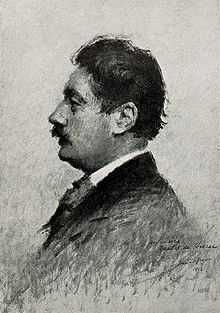Déodat de Séverac

Déodat de Séverac (pronounced: [deoda də sevəʁak]) (Saint-Félix-de-Caraman, Haute-Garonne, 20 July 1872 – Céret, Pyrénées-Orientales, Roussillon, 24 March 1921) was a French composer.
Biography
Of aristocratic background, Déodat de Séverac was profoundly influenced by the musical tradition of his native Languedoc. He is noted for his vocal and choral music, which include settings of verse in Provençal (the historic language of Languedoc) and Catalan (the historic language of Roussillon) as well as French poems by Verlaine and Baudelaire. His compositions for solo piano have also won critical acclaim, and many of them were titled as pictorial evocations and published in the collections Chant de la terre, En Languedoc, and En vacances. A popular example of his work is The Old Musical Box in B-flat major, but his masterpiece is the suite Cerdaña (written 1904—1911), filled with the local color of Languedoc. His motet Tantum ergo is also still sung on occasion.
He left his native Toulouse to study in Paris, under Vincent d'Indy and Albéric Magnard at the Schola Cantorum, an alternative to the training offered by the Paris Conservatoire. He worked as an assistant to Isaac Albéniz and returned to the south of France, where he spent the rest of his rather short life. His opera Héliogabale was produced at Béziers in 1910.
His piano music has been recorded by Aldo Ciccolini.
Selected compositions
_comme_Helene_de_Sparte%2C_1912.jpg)
Works for Piano
- Le chant de la terre (1900)
- En Languedoc (1904)
- Baigneuses au soleil (1908)
- Cerdaña (1904-1911)
- En vacances (1912)
- Sous les lauriers roses (1918)
Operas
- Les Antibels (1907, lost) based on a novel by Émile Pouvillon
- Le cœur du moulin, poème lyrique in two acts (1908)
- Héliogabale, tragédie lyrique in three acts (1910)
Mélodies
- Numerous art songs, including À l'aube dans la montagne (1906) and Flors d'Occitania (1912).
References
- Biography from Naxos
- Biography from Institut de Recherche et Coordination Acoustique/Musique (French)
External links
- Free scores by Déodat de Séverac in the Choral Public Domain Library (ChoralWiki)
- Free scores by Déodat De Séverac at the International Music Score Library Project
|